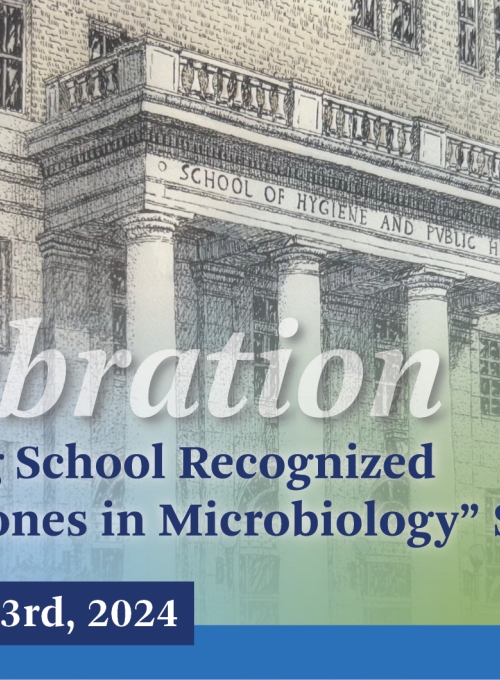
100+ Years of Virology and Immunology & Milestones in Microbiology
A Day of Celebration:
100+ Years of Virology and Immunology and
Bloomberg School Named a Milestones in Microbiology Historic Site
MMI Alumni Return to the Bloomberg School
On Friday, May 3 MMI alumni and friends of the Department returned to the Bloomberg School to reconnect with former class and lab mates, former advisors and mentors, and old friends. The event was also an opportunity for our alumni to meet new faculty and our current students.
The celebration honored the rich history of the Department, the trailblazers in virology and immunology who chose to spend their careers in MMI, and the many pivotal discoveries and scientific milestones that have taken place in MMI laboratories.
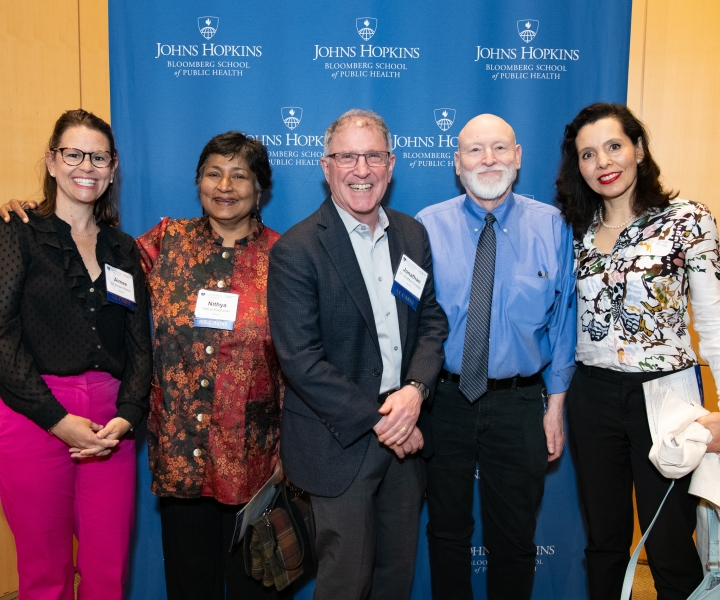
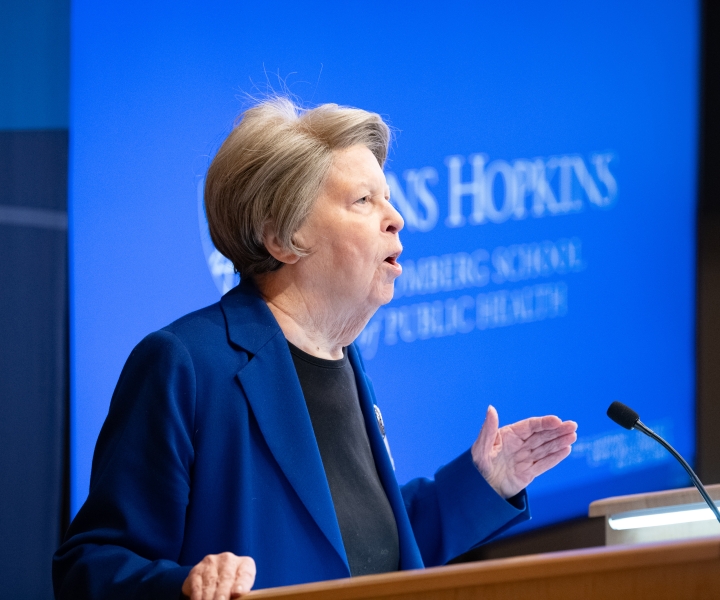
Diane Griffin
The Celebration of Virology and Immunology was the culmination of years of planning deterred for a time by the COVID-19 pandemic. It was Griffin's idea to expand on the Department's 2011 alumni event by highlighting important department research and the legacy of influential past department chairs – Keerti Shah and Noel Rose – each pioneers in their respective fields of virology and immunology.
Diane Griffin addresses the crowd in Sommer Hall at the Celebration of 100+ Years of Virology and Immunology
Bernard Roizman, ScD '56
MMI Alumnus Bernard Roizman ScD ' 56, the Joseph Regenstein Distinguished Service Professor Emeritus of Virology, Department of Virology, University of Chicago, was the Keynote Speaker.
A preview of The Maturation of a Scientist: An Autobiography by Dr. Roizman can be found here.
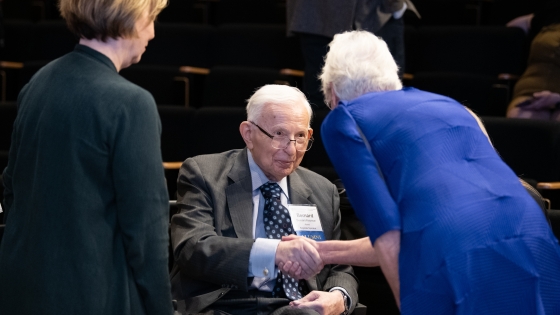
Bloomberg School Dean Ellen MacKenzie greets Bernard Roizman. David Bodian Professor J. Marie Hardwick, MMI's vice chair of research, an MMI ASM Milestones in Microbiology Site Committee member, and the event organizer, looks on.

"The Celebration of 100+ Years of Virology and Immunology was truly a rewarding afternoon. It brought back so many memories of the joys of discovery that overcame the struggles between the eureka moments."
--Rubina Patel, PhD '85, MS '80 together with 1st year ScM student Mahnoor Abdullah, recent ScM graduate (May 2024) Anam Naseem, and MMI PhD student Luciana Ribeiro Dinis of the Prigge Lab
Bloomberg School Recognized as Milestones in Microbiology Historic Site by the American Society for Microbiology (ASM)
The Alfred and Jill Sommer Professor and Chair of the W. Harry Feinstone Department of Molecular Microbiology and Immunology Arturo Casadevall speaks to the audience (left) at the celebration recognizing the Bloomberg School as a Milestones in Microbiology historic site and sees his vision for honoring the history of the Department and celebrating the pivotal scientific discoveries that have taken place at the School come to life.
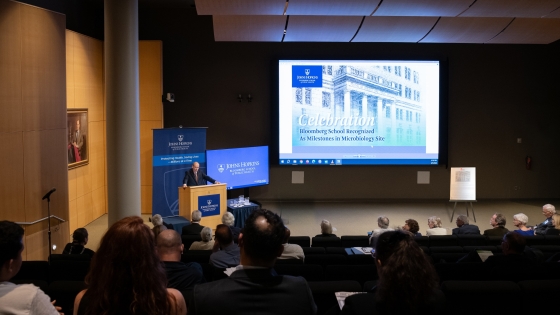
Arturo Casadevall introduces Bernard Roizman, speaks about Dr. Roizman's long and accomplished career, and shares the story behind how Dr. Roizman came to learn bridge when he began his studies at the Bloomberg School in the 1950s.
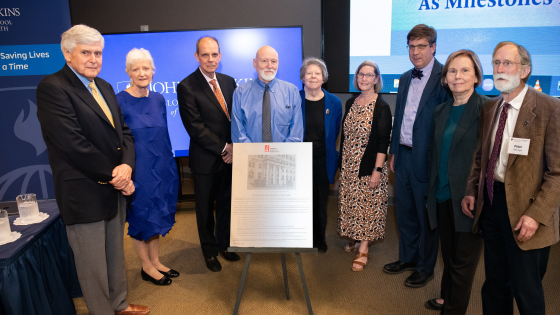
Professor and event M.C. Gary Ketner, Bloomberg School Dean Ellen MacKenzie, MMI dept. chair Arturo Casadevall, Professor Alan Scott, Professor Diane Griffin, ASM President Virginia Miller, Professor David Sullivan, Professor J. Marie Hardwick. and Professor Peter Agre with the plaque given to the Bloomberg School by ASM.
History of the School and Historic Firsts
The Johns Hopkins School of Hygiene and Public Health was founded in 1916. The school is the world’s first independent, doctoral degree-granting, interdisciplinary school of public health. In 2001, the School was renamed the Johns Hopkins Bloomberg School of Public Health to recognize Michael Bloomberg’s support and commitment to public health.
The School was founded with a grant from the Rockefeller Foundation. William Henry Welch, a prominent bacteriologist and pathologist, served as founding director. From the outset, the School housed basic science research laboratories and the first departments dedicated to immunology and virology. Under Welch’s direction, the School soon became a preeminent leader in public health and microbiology. Since the School’s inception, faculty members and their teams in what are now the W. Harry Feinstone Department of Molecular Microbiology and Immunology and the Department of Epidemiology, have contributed multiple historical firsts, pivotal discoveries, and scientific advancements in microbiology. Among them:
1916
First independent, multidisciplinary school of public health
1916
First Department of Immunology
1922
First course on virology (then called filterable viruses)
1925
First Department of Virology (Filterable Viruses)
1941–1947
First delineation of paralytic poliovirus pathogenesis by David Bodian, Howard Howe, and Isabel Morgan
1944 – 1949
First identification of the three pathogenic poliovirus serotypes that were incorporated into effective vaccines by Isabel Morgan, David Bodian, and Howard Howe
1953
First demonstration that Gram-negative bacteria induced rapid coagulation of the hemolymph from horseshoe crabs, by Frederik B. Bang. This observation is the basis for the near-universally used, lifesaving Limulus amebocyte lysate assay for endotoxin.
1957
First isolation of human respiratory syncytial virus (RSV) by Robert Chanock, Bernard Roizman, Ruth Myers, and Laurence Finberg
View Photo Gallery and Video Recording
If you weren't able to attend in person or simply want to take another look
Support the work of MMI
Gifts, both large and small, enable the Department and individual researchers to pursue critical scientific work that cannot be supported by federal funding and also support student and faculty fellowships.
